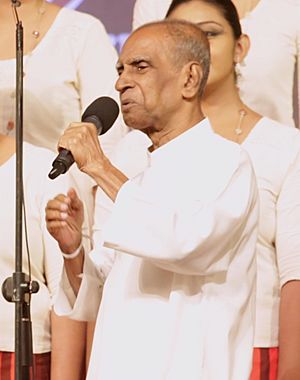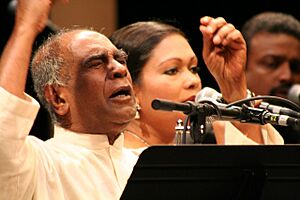W. D. Amaradeva facts for kids
Quick facts for kids
Sri Lankabhimanya Pandit
W. D. Amaradeva
|
|
|---|---|

Pandit Amaradeva in 2014
|
|
| Born |
Wannakuwatta Waduge Don Albert Perera
5 December 1927 |
| Died | 3 November 2016 (aged 88) |
| Nationality | Sri Lankan |
| Education | Bhatkhande Music Institute |
| Alma mater | Bhatkhande Music Institute Siddharta Vidyalaya Kalutara Vidyalaya Moratu Maha Vidyalaya Sri Sumangala College |
| Occupation | Musician, singer, composer , Chancellor of the University of the Visual and Performing Arts |
| Years active | 1947–2016 |
| Spouse(s) | Wimala Amaradewa |
| Children | Ranjana, Subhani, and Priyanvada |
| Awards | Philippine Ramon Magsaysay Award (2001), Indian Padma Sri Award (2002), President's Award of Kala Keerthi (1986), Doctor of Philosophy (Fine Arts) Honoris Causa (University of Kelaniya - 1991), The Degree of Doctor of Letters (University of Ruhuna - 1993), Honorary degree of Doctor of Letters (University of Peradeniya) (1998), Deshamanya (1998), Sri Lankabhimanya (2017) |
Sri Lankabhimanya Wannakuwattawaduge Don Albert Perera (Sinhala: වන්නකුවත්තවඩුගේ දොන් ඇල්බට් පෙරේරා; Tamil: டபிள்யூ. டி. அமரதேவா; 5 December 1927 – 3 November 2016), known as Amaradeva, was a famous Sri Lankan singer, violinist, and composer. He used traditional instruments like sitars and tablas. He mixed Sinhala folk music with Indian ragas. Many people believe his work was key to developing Sinhala music. He is often called the "Maestro of Sri Lankan Music."
In the mid-1950s, Amaradeva started a project called Janagayana. He worked with experts in Kandyan dance to understand Sinhala folk music. He noticed that folk music often had just one main tune. So, he added verses that would lead to a main chorus. This created two parts in songs, which was new for traditional Sri Lankan music. By doing this, he made a unique Sinhala music style. It kept the folk traditions but also added new influences. His work was very important for creating the "sarala gee" music style. Many artists like Sanath Nandasiri and Victor Ratnayake followed this style.
Amaradeva received many awards for his music. These include the Philippine Ramon Magsaysay Award in 2001. He also got India's Padma Sri Award in 2002. From Sri Lanka, he received the "President's Award of Kala Keerthi" in 1986 and the Deshamanya Award in 1998. In 2003, the French government gave him a special honor called the Ordre des Arts et des Lettres. He was also the most popular artist, according to Nielsen Media Research. He represented Sri Lanka at many events, including a UNESCO meeting in 1967. Several universities gave him honorary degrees for his contributions to music.
In 1972, the government of the Maldives asked Amaradeva to compose music. He created the music for the Maldivian National Anthem.
Amaradeva passed away on 3 November 2016, at 88 years old. He died because of heart failure. The government held a state funeral for him. There was also a week of national mourning in Sri Lanka.
Contents
Early Life and Family
Amaradeva was the youngest of seven children. His father, Wannakuwatta Waduge Don Ginoris Perera, was a carpenter. His mother was Balapuwaduge Maggie Weslina Mendis. He was born in Koralawella, Moratuwa. His father was a Buddhist, and his mother was a Methodist. This meant he grew up with both Christian and Buddhist values and music.
Amaradeva started learning music when he was very young. His father made and fixed violins at a carpentry school. Amaradeva would often play the violin while his mother sang hymns. His older brother also taught him Indian classical music. On his seventh birthday, his father gave him his own Japanese tin violin.
School Days and Musical Talent
Amaradeva first went to school at Sri Saddharmodaya Buddhist mixed School. The principal, Mr. K. J. Fernando, noticed Amaradeva's talent. He introduced him to Kumaratunga Munidasa, a famous scholar. Kumaratunga liked Amaradeva's singing. Being around these scholars made him interested in his country's identity and language.
When he was in fifth grade, a music teacher named Mr. W. J. Fernando came to his school. Mr. Fernando was Amaradeva's first school music teacher. He saw Amaradeva's talent and helped him with singing and playing. Amaradeva won all the school singing competitions. His teacher even let him lead the class when he was away.
While in school, he won a poetry contest at Moratuwa Vidyalaya. He also led his school choir to win a contest by the Colombo Arts Society. Because he won the poetry contest, his teachers arranged for him to recite poetry on Radio Ceylon. In 1945, Amaradeva won a gold medal in a music and violin contest. His fame grew beyond his hometown. Because he was so popular, several schools offered him scholarships.
Amaradeva then went to Sri Sumangala College, Panadura, on an English scholarship. There, he became friends with the music teacher and principal, Danister Thomas Fernando. He was the older brother of Amaradeva's first music teacher. D. T. Fernando helped Amaradeva get into Kalutara Vidyalaya and later Siddharta Vidyalaya Balapitiya.
Family Life
Amaradeva married Wimala Gunaratne in 1962. She was a teacher and had studied at Musaeus College. She also performed in a dance group. They had three children: Ranjana, Subhani, and Priyanvada. Wimala Amaradeva passed away in 2021 at 86 years old.
Musical Journey
Young Amaradeva met Sunil Santha, a well-known artist, at one of his concerts. Sunil Santha invited Amaradeva to audition. He played for Sunil Santha and others and impressed them. After the audition, Sunil Santha invited Amaradeva to stay at Chitrasena Studios.
Around that time, a film called Ashokamala was being made nearby. Amaradeva was introduced to Mohamed Ghouse Master, who was in charge of the film's music. Ghouse saw Amaradeva's talent and hired him as the main violinist for the orchestra. Amaradeva left his studies and went to India with Ghouse to work on the film. He sang, danced, and acted in the film, performing the song "Ayi Yameku Kale Ale."
In Lucknow, India, Amaradeva studied at Bhatkande. He learned from the great violinist Vishnu Govind Jog. Jog considered Amaradeva a very talented student. After five years of training, Amaradeva earned two Visharads, one for violin and one for singing. He returned to Sri Lanka as Pandit Wannakuwatta waduge Don Amaradeva. The name Amaradeva means "Immortal god." It was given to him by Professor Ediriweera Sarachchandra, a famous playwright.
Creating a Unique Sound
At this time, Sri Lanka was becoming an independent nation. People were asking what Sri Lankan music should sound like. Amaradeva started mixing local folk music with the North Indian ragas he had learned. This created a new, more advanced style of music.
He also experimented with Western harmonies and South Indian music styles. In his song 'Ran Dahadiya Bindu Bindu', he even included Baila music from his hometown. His most important work was with the lyricist Mahagama Sekera. They combined classical Sinhala poetry with his unique music. Over time, Amaradeva's music came to represent the spirit of the nation.
He composed music for many types of performances. These include ballets like Karadiya and Nala Damayanthi. He also composed for films such as Ranmuthu Duwa and Gam Peraliya. He created music for theatre, radio, and television too. He also invented a musical instrument called the mando-harp, which combines a mandolin and a harp.
Amaradeva helped introduce new artists to the public, like Nanda Malini and Edward Jayakody. Many artists, including Sunil Edirisinghe and Victor Ratnayake, say he greatly influenced their work. Dr. Lester James Peries called his voice the greatest musical instrument. Amaradeva is seen as the most important musician of Sinhala culture. He played a key role in creating a national music tradition.
Amaradeva was the second Chancellor of the University of the Visual and Performing Arts. In 2015, he sang a duet with the young artist Umaria Sinhawansa. This song, Hanthana Sihine, has been viewed millions of times online.
Death and Legacy
Amaradeva was taken to Sri Jayawaradanapura Teaching Hospital due to a sudden illness. He passed away on 3 November 2016, at the age of 88, from heart failure. The government held a state funeral for him. There was also a week of national mourning. His body was displayed at the Independence Memorial Hall for two days. This was the first time in Sri Lanka's history that remains were kept there.
A special musical center will be built in Colombo to honor Amaradeva. It will be called Amaradeva Asapuwa. President Maithripala Sirisena took part in the opening ceremony for this project.
Awards and Honors
Amaradeva received many important awards and honors:
- The title of Sri Lankabhimanya, the highest national honor in Sri Lanka (given after his death in 2017).
- Officier (officer) of the Ordre des Arts et des Lettres from the French government (2003).
- Padma Sri Award from India (2002).
- The Ramon Magsaysay Award from the Philippines (2001).
- Title of Deshamanya from the Government of Sri Lanka (1998).
- Honorary degree of Doctor of Letters from University of Peradeniya (1998).
- Honorary degree of Doctor of Letters from University of Ruhuna (1993).
- Honorary degree of Doctor of Philosophy (Fine Arts) from University of Kelaniya (1991).
- Title of Kala Keerthi from the Government of Sri Lanka (1986).
Images for kids
 | Toni Morrison |
 | Barack Obama |
 | Martin Luther King Jr. |
 | Ralph Bunche |




